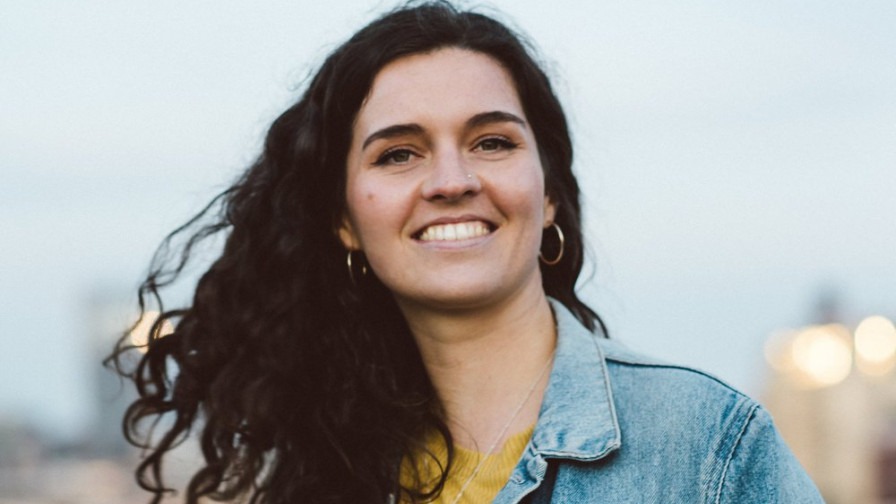Hattie Whitehead's Reflections on the Musicians in Healthcare Mentoring Programme 2021
Hattie is a professional performing singer and song-writer who first joined the programme in 2020. After a pause on the programme due to COVID-19, we were able to reintroduce activities online during which Hattie was able to shadow practitioners before leading her own activities with children and young people. The Musicians in Healthcare Mentoring Programme is supported by Youth Music and delivered in partnership with Sound Connections.
I was introduced to the Musicians in Healthcare Mentoring Programme with rb&hArts in 2020 through a friend who works on the Vocal Beats programme. I had expressed a desire to use my performing and writing experience to bring music to those that don’t have the same opportunities in music making. Joining this programme, where I could shadow musicians in healthcare was an excellent opportunity to learn more about this different approach to music making.
In my first session, I joined violinist in residence Adrian Garratt in visiting transplant wards at Harefield hospital, playing music to patients. Adrian made sure to cater for everybody’s needs. Whether it involved waiting and giving space for requests or taking the initiative to play music of his own choosing, he was always looking for cues from the patient or their family, however subtle. A beautiful and difficult part of the session was seeing Adrian play to a patient that was dying. For the duration of his playing, a space was created for the family to connect with their loved one. Adrian helped to create a positive experience in a sad time. Whilst his repertoire adapted according to the differing needs of patients, I noticed that he was consistently confident, relaxed, and personable. He centred the session on the patients’ needs but took care to include everybody in the room. It was a collaborative, welcoming and positive session.
Several months later, after an unexpected hiatus due to COVID-19 developments, the rb&hArts’ music programmes were established in a digital context and we were invited to continue our shadowing sessions online. This brought a new dimension to the music sessions. We would be learning the attributes necessary for successful music sessions whilst also navigating practical limitations of remote online working. This new context highlighted another quality in the rb&hArts musicians; their confidence and openness encourage a relaxed environment that promotes creativity and allows for different directions to be taken according to the creative needs of the participant. I witnessed this in a session with Heather McClelland where the participant wanted to write a song. Heather’s experience as a songwriter and facilitator meant she had the tools and exercises relevant to fulfil the participant’s goals, however she also had the flexibility to encourage them to bring their own ideas. She was constantly looking for ways to learn from the participant and this created an equal and collaborative environment where creativity flowed.
During the programme I led two one-to-one music sessions on Zoom. In the first, I was able to put the flexibility and adaptability that I had observed into practice. The session involved performing songs and encouraging the participant to join in by singing or playing instruments they had at home. I experienced first-hand the importance of getting to know the participant and being sensitive to their communication needs. For non-verbal participants, it was important to pay attention to the fact that their body language and energy were key aspects of their communication.
I led the second session with the support of Heather McClelland. Our aim was for the participant to write a song in an hour, so it was important to follow a more detailed plan. I was reminded during the session that even with a more structured plan, the same rule applies of being open to change. Our goals for the session had to be flexible to allow the fact that some of the participant’s ideas would be immediate, and some would take more time. Therefore, we mapped out a verse and a chorus, leaving the participant with the materials necessary to complete the song in their own time. I felt I had stepped out of my comfort zone as a leader and created an encouraging and relaxed environment, whilst taking note of points to improve on.
The program has given me a new angle to work from. I have learnt the importance of putting the participant’s needs at the centre of decisions. I have observed how to take cues from participants and experienced sensitivity and openness to a collaborative and inclusive environment that encourages the safety needed for creativity. Patients at Royal Brompton and Harefield Hospitals are empowered to shape their own music sessions. Their feedback is valued, and musicians take the time and care to understand how they can facilitate each individual’s participation. This is an important foundation to build any session from and I am so grateful to all the musicians and participants for sharing their experience with me.



